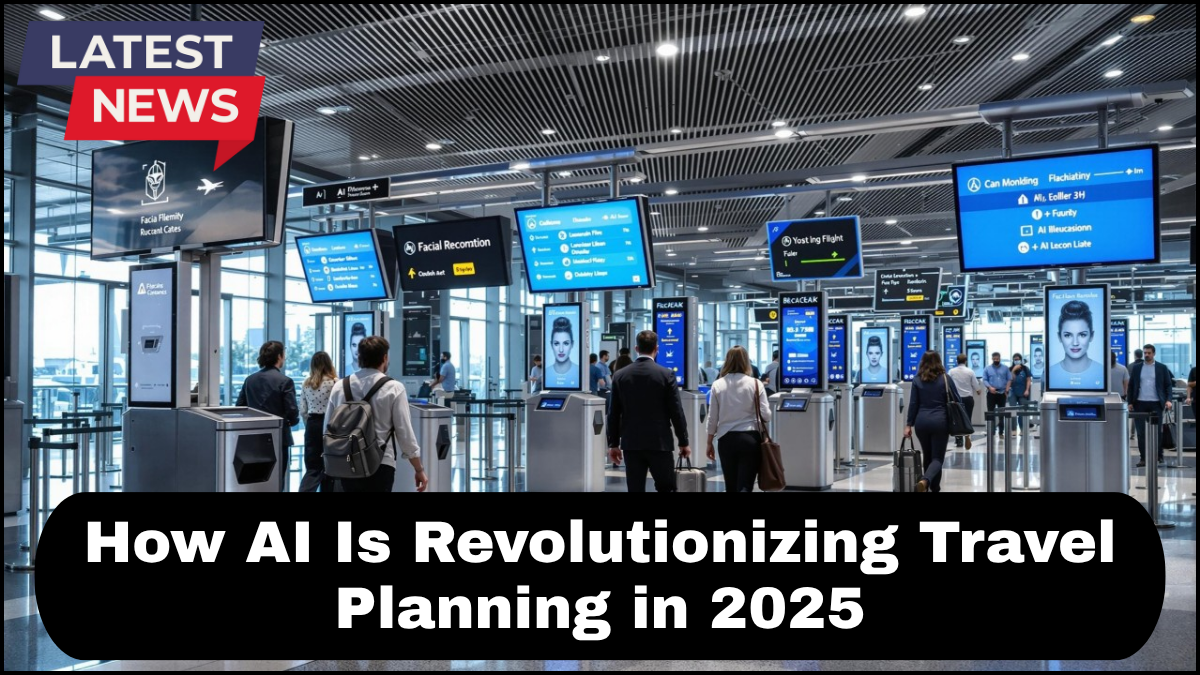Artificial Intelligence (AI) has redefined industries across the board, but one of its most significant and user-facing transformations is happening in the world of travel. In 2025, AI in Travel is not a future trend—it’s the current standard, transforming how people plan, book, and experience their journeys. From hyper-personalized itineraries to seamless booking automation, AI is making travel smarter, faster, and more intuitive than ever before.

AI-Driven Personalization Takes Center Stage
Gone are the days of generic travel packages. AI in Travel 2025 means personalized planning powered by deep data analysis. AI tools now analyze user behavior, preferences, past trips, social media activity, and even biometric data to tailor experiences that fit like a glove.
Want a quiet beach retreat that matches your sleep patterns and dietary needs? AI can compile options that align with your wellness goals. Looking for urban adventures with cultural depth? Algorithms can detect your interests and curate a list of events, landmarks, and hidden gems within minutes.
Booking Automation Reduces Friction
Booking automation has evolved far beyond simple online forms. Intelligent booking systems use natural language processing (NLP) and machine learning to make reservations based on voice or chat commands. Travelers can now say, “Book me a 3-day trip to Tokyo with a hotel near Shinjuku and vegetarian food options,” and receive real-time results with complete itineraries.
Dynamic pricing models are also optimized by AI, ensuring travelers receive the best prices based on predictive analytics, supply-demand data, and competitor comparisons. The era of spending hours comparing websites is over.
Real-Time Assistance Through AI Chatbots
AI chatbots have become digital concierges. These smart assistants are available 24/7 across multiple platforms, answering travel questions, resolving issues, and even making last-minute changes to itineraries. Whether you’re stuck at an airport or need a quick recommendation for dinner, AI bots can act instantly, often with better speed and accuracy than human support.
Some AI systems can now proactively detect disruptions—like weather delays or political unrest—and suggest or even auto-rebook alternate routes. This level of predictive intelligence is making travel more resilient.
Smarter Search and Discovery
AI enhances search capabilities by understanding context, preferences, and travel constraints. Instead of sifting through irrelevant results, users are shown suggestions that are not only relevant but often delightfully unexpected.
For instance, AI platforms in 2025 can suggest eco-friendly destinations for sustainability-conscious travelers, or off-season travel ideas that fit budget constraints without sacrificing quality. These smarter search results are driven by user intent rather than just keywords.
Seamless Integration With Wearables and IoT
The integration of AI with wearable technology and the Internet of Things (IoT) is creating a fluid travel experience. Smartwatches and travel bands now sync with AI travel apps to provide real-time alerts, boarding passes, language translation, and navigation assistance.
Imagine arriving in a new country and your wearable device automatically updating you with local customs, currency exchange rates, and real-time transit schedules. AI’s integration with physical devices is eliminating uncertainty and empowering travelers with relevant, real-time data.
Hyper-Automated Corporate Travel
In the corporate world, AI is simplifying business travel. Automated systems can track expenses, optimize travel routes for multiple employees, and ensure policy compliance. Corporate travel platforms powered by AI in 2025 offer integrated dashboards that provide managers with real-time insights and control without micro-managing individual trips.
These systems also integrate with HR platforms, enabling seamless travel approvals, visa tracking, and itinerary synchronization with meetings and conferences.
FAQs About AI in Travel 2025
Q: How is AI different from traditional travel planning tools?
A: Traditional tools are static and require manual input. AI adapts to your preferences, learns over time, and can proactively assist you with smart suggestions, real-time updates, and predictive planning.
Q: Is booking automation safe and reliable?
A: Yes. Booking automation in 2025 is highly secure, using encrypted platforms and verified databases. It not only speeds up the process but also reduces human error and guarantees price efficiency.
Q: Will AI eliminate human travel agents?
A: Not entirely. AI handles routine tasks efficiently, but human agents still play a role in complex, high-touch experiences. The future lies in collaboration between AI systems and human expertise.
Q: Can AI help with last-minute travel changes?
A: Absolutely. AI-powered systems monitor real-time conditions and can adjust bookings, suggest alternatives, or provide instant support when plans change unexpectedly.
Q: Are AI travel platforms expensive to use?
A: Most are built into popular apps and services at no additional cost. In fact, AI often saves money by optimizing bookings and uncovering discounts that users might miss manually.
click here to learn more